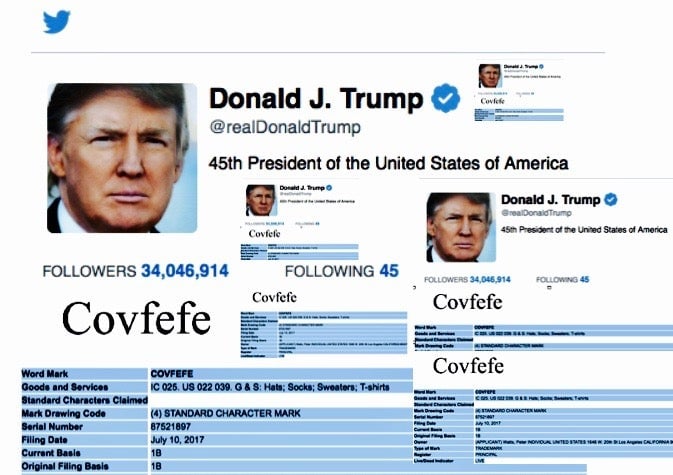Thirty-five applications claiming “Covfefe” show US trademark law is confusing
Donald Tump tweeted the word “covfefe”—possibly a typo?—in the wee hours of May 31. Since then, the US president’s linguistic mystery has inspired 35 trademark applications at the Patent and Trademark Office (PTO).


Donald Tump tweeted the word “covfefe”—possibly a typo?—in the wee hours of May 31. Since then, the US president’s linguistic mystery has inspired 35 trademark applications at the Patent and Trademark Office (PTO).
A July 18 query in the PTO’s Trademark Electronic Search System reveals that applicants claimed six variations of “covfefe.” The most impressive is “Covfefe carry on vigilantly fighting evil forever.”
Based on the pending applications, you might suspect we’ll soon be bedecked in covfefe gear from stocking caps to clogs, drinking covfefe coffee and beer, and perfumed in covfefe scents while photographers capture us on film enjoying all the covfefe with special underwater covfefe camera gear powered by covfefe batteries.
But that would be wrong. Most of the proposed products are just ideas. That’s just one flaw in the logic of the pending applications.
To obtain a trademark based on a word or phrase, as in this case, the mark must be used in commerce and associated with a particular good or service. That means first the mark is put to work, and only then might an application get approved for a specific use. As it stands now, 32 of the 35 applications containing “covefefe” don’t even claim to be using the mark in business.
Covfefe is also not associated in the marketplace with any of the proposed offerings. It’s unlikely the applications will succeed, says intellectual property attorney Jason Rosenberg, a partner at Alston & Bird in Atlanta. He told IP Watchdog on July 11 that filing a trademark application to claim the right to use a particular term “is a fundamental misunderstanding of [US] trademark laws.”
Covfefe applicants just want to put dibs on the word, which is not how trademark law works. Entities can police and protect their intellectual property, but they cannot own verbiage, and simply affixing a word to a product doesn’t make that word a trademark.
A true mark is a brand name and the holder can prevent a competitor from creating market confusion by using the same name on a similar product. It cannot stop all others from using the word in all other contexts. Take the word “apple.” Used in a specific context—like Apple computers—it’s a trademark. But the tech giant can’t bar everyone from referring to the fruit or using “apple” in company names where there’s no competition or chance of consumer confusion.
Arguably, covfefe could become a mark. If consumers came to associate the word with a good or service to an extent that “covfefe” became a brand, acquiring a meaning separate from the internet joke, ownership claims could someday be legitimate. But that takes time.
Meanwhile, the trademark applicants have proposed a stunning array of delightful covfefe items, like beach balls, alternative energy education toys, underwater camera equipment, sandwiches, girdles, wearable blankets, investment advice, and more. Nothing should stop them from producing these products and offering these services, whatever the outcome of their trademark applications.